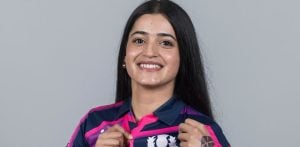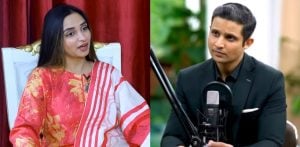Aged 12, she defeated chess legend Magnus Carlsen
In the game of chess, some players stand out above the rest with their strategy and forethought, leaving their mark on the board and in history.
Female Indian chess players are among these legends; their skill in the game inspires generations and transcends boundaries.
These women have carved new paths and broken prejudices, demonstrating that gender is not a barrier to brilliance on the 64 squares.
They range from prodigies who displayed their skill at a young age to seasoned veterans who have won international championships.
We look at the lives and accomplishments of seven exceptional Indian women who have become experts in the game.
Humpy Koneru

Humpy showcased her prowess early on, winning three gold medals at the World Youth Chess Championship.
Her victories spanned across various age categories, including the under-10, under-12, and under-14 girls’ divisions.
In 2001, Humpy ascended to victory at the World Junior Girls Championship, solidifying her status as a rising star.
Despite narrowly missing the top spot in subsequent editions, her remarkable performance earned her the esteemed title of the eighth-ever female Grandmaster in 2002.
Undeterred by gender disparities, she fearlessly challenged herself in the intensely competitive arena of the World Junior Championship in 2004, achieving a commendable tie for fifth place.
Her dominance extended to the British Women’s Championship, where she clinched titles in both 2000 and 2002.
In a display of her formidable skills, she emerged victorious at the Asian Women’s Individual Championship and the Indian Women’s Championship in 2003.
The pinnacle of her achievements came in 2005 when she triumphed at the North Urals Cup, outplaying some of the strongest female players globally.
Throughout her career, she maintained a remarkable consistency, finishing as the runner-up in multiple editions of the FIDE Women’s Grand Prix series.
Her contributions to the Indian chess scene were duly recognised when she secured individual bronze at the Women’s World Team Chess Championship in 2015.
In a remarkable comeback after a maternity sabbatical, she won the title of women’s World Rapid champion in 2019.
Humpy’s remarkable achievements were celebrated in 2020 when she was honoured with the BBC Indian Sportswoman of the Year award, a testament to her enduring impact on the sport.
Continuing to excel on the international stage, Humpy played a pivotal role in securing a bronze medal for the women’s India team at the 2022 Chess Olympiad.
Harika Dronavalli

Harika’s early years were marked by notable successes, including a medal at the under-9 National Championship and a silver medal at the World Youth Chess Championship for under-10 girls.
Notably, she etched her name in history as the second Indian woman to attain the prestigious title of Grandmaster, following Koneru Humpy.
Throughout her career, Harika has been a consistent force in women’s chess.
She secured three bronze medals in the Women’s World Chess Championship in 2012, 2015, and 2017.
Her exceptional contributions to the sport were recognised by the government of India, which bestowed upon her the Arjuna Award for the year 2007–08.
In a defining moment of her career, she clinched victory at the FIDE Women’s Grand Prix event in 2016, catapulting her from world no. 11 to world no. 5 in the FIDE women’s ranking.
Harika’s dedication and excellence in chess earned her the Padma Shri award in 2019.
Divya Deshmukh

In her burgeoning chess career, Deshmukh has amassed a string of impressive victories.
Her triumphs include clinching the title at the 2022 Women’s Indian Chess Championship and securing an individual bronze medal at the 2022 Chess Olympiad.
Notably, she played a pivotal role in the gold medal-winning FIDE Online Chess Olympiad 2020 team.
Deshmukh’s ascent in the chess ranks has been remarkable, reflected in her impressive ranking as the 7th-ranked woman chess player in India as of September 2023.
Her stellar performance continued in that year, where she emerged victorious at the Asian Women’s Chess Championship.
A defining moment in the International Master’s career came at the Tata Steel India Chess Tournament in 2023.
She defied expectations as the bottom seed in the women’s rapid section, beating Harika Dronavalli, Vantika Agrawal, and Koneru Humpy.
Despite facing formidable adversaries, including Women’s World Champion Ju Wenjun, she showcased her mettle by securing draws and suffered her only loss to Polina Shuvalova.
Vaishali Rameshbabu

Vaishali is the elder sibling of Grandmaster R Praggnanandhaa and was nurtured in a household where chess was a way of life.
Her father, Rameshbabu, a dedicated chess enthusiast, introduced her to the intricacies of the game at a tender age.
Vaishali soared to prominence by clinching the Girls’ World Youth Chess Championship for Under-12s in 2012 and Under-14s in 2015.
Aged 12, she defeated chess legend Magnus Carlsen, shocking the world in 2013.
In 2016, Vaishali attained the title of Woman International Master (WIM), a testament to her growing prowess in the game.
Her ascent continued as she secured the prestigious Woman Grandmaster (WGM) title in 2018.
Notably, she played a pivotal role in India’s historic victory at the Online Olympiad 2020, where she contributed to the team’s gold medal triumph.
The accolades continued to pour in for Vaishali as she earned the title of International Master (IM) in 2021.
In 2022, she claimed victory at the 8th Fischer Memorial, garnering her second Grandmaster norm.
In a historic moment, Vaishali secured victory at the FIDE Women’s Grand Swiss 2023.
Then, in December of that year, she crossed the coveted 2500 Elo rating threshold, making history as part of the world’s first sister-brother Grandmaster duo alongside her sibling.
Vaishali’s remarkable contributions to chess were duly recognized as she was honoured with the Arjuna Award by the President of India in January 2024.
Tania Sachdev

Tania Sachdev was introduced to chess at the tender age of 6 by her mother.
Her prodigious talent manifested early on as she won her first international title at the age of eight.
Under the guidance of coach K.C. Joshi during her formative years, Sachdev’s prowess on the chessboard became increasingly evident.
Notable among her early achievements are her triumph as the under-12 Indian champion and her remarkable feat as the Asian U14 girls’ champion in 2000.
Her talent was further underscored by her bronze medal win at the 1998 World Youth Chess Championships in the Girls U12 division and her victory at the 2002 Asian Junior Girls Championship.
In 2005, Sachdev became the eighth Indian player to be awarded the WGM title.
Her dominance continued as she was victorious at India’s National Women’s Premier Chess Championship in 2006 and 2007.
Sachdev’s other achievements include a bronze medal at the 2012 Women’s Chess Olympiad and multiple team silver medals at the Women’s Asian Team Championship.
Sachdev’s dedication and excellence in chess were duly recognised as she was conferred with the Arjuna Award in 2009, a fitting tribute to her outstanding contributions to the sport.
Padmini Rout

Padmini Rout holds the esteemed titles of IM and WGM.
Rout’s journey to chess greatness began with her maiden national title victory in the under-11 girls’ category at Nagpur in 2005.
In the ensuing years, she won titles in various age categories, including the Indian under-13 girls’ championship and the Asian under-12 girls’ championship in 2006.
In 2008, she triumphed for the U14 girls in both the Asian and World Youth Chess Championships.
Throughout representing India, she won a gold medal at the 2014 Women’s Chess Olympiad and represented the team in 2016 and 2018.
Recognising her exceptional contributions to the sport, Rout was honoured with the prestigious Biju Patnaik Sports Award in 2007 and the Ekalavya Award in 2009.
Likewise, she was victorious in the National Women’s Premier Championship an impressive five times, securing consecutive titles from 2014 to 2017 and reclaiming it in 2023.
Subbaraman Vijayalakshmi

Subbaraman Vijayalakshmi, an eminent figure in Indian chess, holds the titles of IM and WGM.
Renowned for her exceptional performance in the Chess Olympiads, she has won more medals for India in these tournaments than any other player.
Her dominance extends to national competitions, where she has clinched almost all age group titles, including the senior title.
Her chess journey commenced at the Tal Chess Open in 1986.
She quickly rose through the ranks, securing victories in various age categories, including the Indian Championship in the U10 and U12 girls’ categories in 1988 and 1989 respectively.
Among her achievements are her triumphs at the Asian Zone tournaments in 1997 and 1999.
Additionally, she grabbed the Commonwealth Women’s Championship titles in 1996 and 2003.
Her dominance in the Indian Women’s Championship is unparalleled, with victories spanning from 1995 to 2002.
In 2001, she made history by becoming the first Indian to achieve the title of WGM.
Her remarkable achievements include winning silver medals for her performance at board 1 in the 34th and 36th Chess Olympiads in 2000 and 2002.
As we come to a close of our investigation into these extraordinary people, one thing is clear: their influence on the chess world extends beyond place and time.
As we honour these accomplished female Indian chess players, we also recognise the game’s transformational potential.
Whilst these women have made a name for themselves, they’ve solidified India’s stance in the sport.























































![Spectre Kissing scenes censored by Indian Board “Spectre is an internationally applauded film, [but] again Pahalaj Nihalani messes it up by shading it with his own thought process.](https://www.desiblitz.com/wp-content/uploads/2015/11/spectre-censor-Featured-Image-249x122.jpg)






